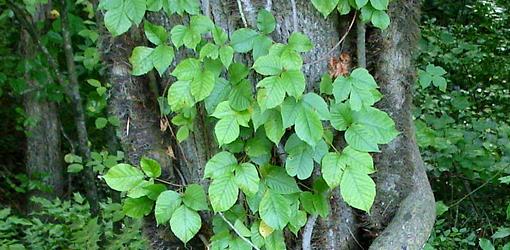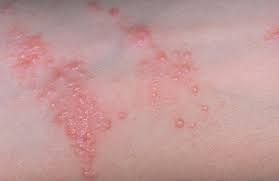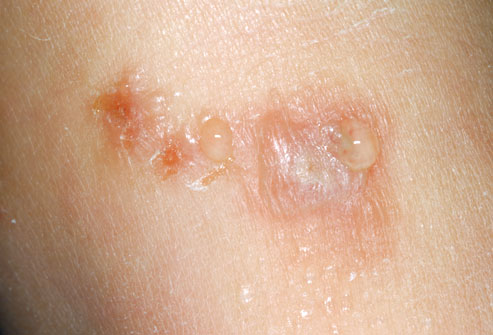Native to North America, poison ivy is a climbing vine and produces an oily chemical called urushiol. The chemical stays on the surface of its leaves and can cause allergic reaction when you touch it. You may experience itchiness, redness, and painful inflammation on your skin. Poison sumac and poison oak can also cause similar symptoms. But many people are concerned about whether it can be cured and it is contagious. Let's find out the answer.

Is Poison Ivy Contagious?
First thing first, the discomfort caused by poison ivy is not contagious. Wondering why? Here comes the detail:
The rash you develop after being exposed to poison ivy is allergic contact dermatitis. You develop an allergic reaction when you touch the stem, leaves, berries, or roots of the plant. Touching contaminated objects may also lead to a reaction. For example, if you walk through poison ivy and then touch your shoes later, you may get some of urushiol on your hands and then on your body. This may trigger an allergic reaction. The chemical can stay on objects for years and cause a skin reaction whenever you touch the surface.
So the condition itself is not contagious because the blisters you develop do not contain urushiol, which is the reason why you develop an allergic reaction in the first place. It means you cannot get a poison ivy rash from someone who is already dealing with a rash. You have to touch the chemical directly to develop a reaction.
Incubation Period of Poison Ivy Rashes
Now you have the answer to the question, "Is poison ivy contagious?" it is equally important to learn a bit about its incubation period. You may think you have not touched urushiol because you do not have any symptoms, but the reality is different. The incubation period for poison ivy is 5-21 days, so you may notice the rash appear several days after being exposed to poison ivy. Repeated exposure may make the rash appear within 12-48 hours of exposure.
How to Know If I Get Infected with Poison Ivy
The most common symptoms of the rash are small bumps on the skin, red streaks, itching and blisters that may leak fluid. Some people may develop a severe allergic reaction after being exposed to the poison ivy oil. They may experience trouble breathing with swelling of the mouth, face, genitals, and neck. The rash may take a week or more to show up the first time and last about 10-21 days. In severe cases, it may last up to 6 weeks.
When to Seek Medical Care
You should call your doctor if you develop a severe allergic reaction or you have inhaled the smoke from a burning plant of poison ivy. Blisters with pus, swelling of the skin, and high fever are other complications requiring an immediate visit to your doctor. Besides, just go see your doctor if your rash does not get better in a few weeks.


How to Deal With Poison Ivy Rash
Is poison ivy contagious? It is not. However, you will develop the rash when you get exposed to the oil present on the surface of poison ivy leaves. If it happens, you should take the following steps to comfort yourself.
- Use soap and warm water to wash your skin thoroughly. The earlier you wash your skin, the better it is. It prevents the oil from entering your skin.
- Use a brush to scrub under your fingernails to ensure the plant oil does not spread to other parts of your body.
- Apply cool compresses on your affected skin and reduce body heat and sweating to relieve itching.
- Try hydrocortisone cream or calamine lotion to reduce blistering and itching.
- Get an oatmeal bath product and add it to your bath water. Soaking in lukewarm water with aluminum acetate or oatmeal may help dry the rash quickly and reduce itching.
- Try antihistamines if lotions, creams, and bathing do not help.
- Talk to your doctor and take steroids to deal with severe allergic reactions or to treat a rash around genitals or face.
- Under no circumstances should you be touching clothing or skin that may still have plant oil on the surface.
- Under no circumstances should you be burning poison ivy, sumac, or oak because it can cause a serious allergic reaction.
Things to Avoid
Overall, the treatment option depends on the severity of your condition. The rash usually responds well to self-care methods and goes away within 2-3 weeks. If it persists, you should see your doctor who may give you an oral corticosteroid or a prescription antibiotic if you have an infection on the affected skin.
How to Prevent Poison Ivy Rash
The negative answer to "Is poison ivy contagious?" does not make prevent this annoying condition any less important because it is quite irritating to deal with the rash caused by poison ivy. Here are some of the steps to take:
- Wear long pants, socks, and long sleeves when walking in areas where there are poison ivy plants.
- Make use of Ivy Block lotion or other skin products to reduce risk of a rash.
- Learn to differentiate between poison ivy, sumac, oak, and other plants to avoid contact.
- Remove any poison ivy plants you have near you but do not come in direct contact or burn them.
- Wear gloves and use soap and hot water to wash your shoes and clothes.
- Clean your animals properly to get rid of any plant oil from their fur.
